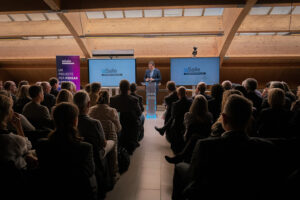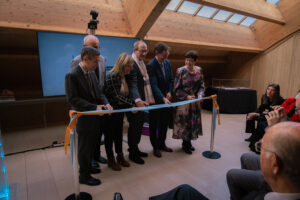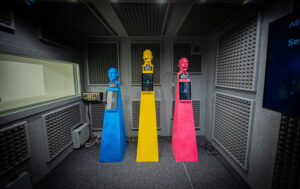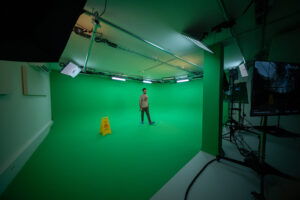Campus La Salle Barcelona: Pioneer in Transdisciplinary Research and Artistic Creation
 At the end of October 2024, Campus La Salle Barcelona inaugurated the Interactive Arts & Science laboratory (IASlab), a pioneer in transdisciplinary research and artistic creation.
At the end of October 2024, Campus La Salle Barcelona inaugurated the Interactive Arts & Science laboratory (IASlab), a pioneer in transdisciplinary research and artistic creation.
The over 3,000 square-metre building includes research laboratories for Artificial Intelligence, animation and digital art, audio-visual post-production, interactive robotics, visual effects, virtual reality, augmented reality, a reverberation chamber, an anechoic room for acoustics research, a recording studio, as well as an immersive room for digital art creation.
It is the first digital arts and technology research laboratory in Spain and one of the first in Europe located on a university campus, with innovative equipment and top technologies at the service of researchers, students, artists, startups, companies and institutions.
 In this way, more than 40 research projects, several of them in collaboration with agents outside the university, are already under development at the IASlab, considered by its Rector, Josep M. Santos, an “evolution” for the Campus: “for more than 100 years we have been pioneers, first in Telecommunications Engineering; then in Acoustics, Image and Sound and Multimedia; and for years now in Animation, Visual Effects, Digital Arts and also in Artificial Intelligence”.
In this way, more than 40 research projects, several of them in collaboration with agents outside the university, are already under development at the IASlab, considered by its Rector, Josep M. Santos, an “evolution” for the Campus: “for more than 100 years we have been pioneers, first in Telecommunications Engineering; then in Acoustics, Image and Sound and Multimedia; and for years now in Animation, Visual Effects, Digital Arts and also in Artificial Intelligence”.
“We innovate with programmes, by creating infrastructures and carrying out applied research with the constant aim of generating a positive impact on society, a transformative impact,” stressed the Rector of the La Salle Barcelona Campus.
For her part, the Head of Research and Innovation, Ms Rosa Maria Alsina, explained that “the IASlab pushes us further in research and transfer, as a city and as a key region in southern Europe in the development of the audio-visual industry, digital creativity, immersiveness and multisensory technologies”.
 The execution of IASlab has involved an investment of more than 6 million euros, co-financed with European funds granted by the Generalitat of Catalunya for singular projects. In addition, La Salle Campus Barcelona has invested 2.4 million euros in the expansion of laboratories and instrumentation.
The execution of IASlab has involved an investment of more than 6 million euros, co-financed with European funds granted by the Generalitat of Catalunya for singular projects. In addition, La Salle Campus Barcelona has invested 2.4 million euros in the expansion of laboratories and instrumentation.
IASlab is a university laboratory designed to take a step forward in the integration of teaching, research, innovation and culture, with spaces conceptually grouped into structured creation rooms, maker spaces, production spaces and workshops, city labs, exhibition rooms and agoras. All of these are points of debate and conceptualisation of ideas, where students, researchers, companies and entrepreneurs interact on the basis of the learning by challenge that characterises the education at Campus La Salle Barcelona. The equipment of a laboratory for research into Robotics and its relationship with people, for example, seeks to offer solutions in the field of health.
 It is also worth noting that the IASlab building is sustainable. Bioclimatic architectural techniques have been applied to minimise energy consumption and optimise comfort, and the refurbishment, rather than demolition, has allowed the use of resources to be optimised by improving energy efficiency and the performance of the materials used. In addition, the new equipment has solar panels that provide almost 70% of the energy demanded by the building and 120 biological batteries to save water, compensate for heat and generate energy thanks to the activity of micro-organisms in the soil. It also has a 250-square metre-gallery on the south façade that captures radiation in winter and protects from excess sun in summer.
It is also worth noting that the IASlab building is sustainable. Bioclimatic architectural techniques have been applied to minimise energy consumption and optimise comfort, and the refurbishment, rather than demolition, has allowed the use of resources to be optimised by improving energy efficiency and the performance of the materials used. In addition, the new equipment has solar panels that provide almost 70% of the energy demanded by the building and 120 biological batteries to save water, compensate for heat and generate energy thanks to the activity of micro-organisms in the soil. It also has a 250-square metre-gallery on the south façade that captures radiation in winter and protects from excess sun in summer.
* Source and photographs: Campus La Salle Barcelona.